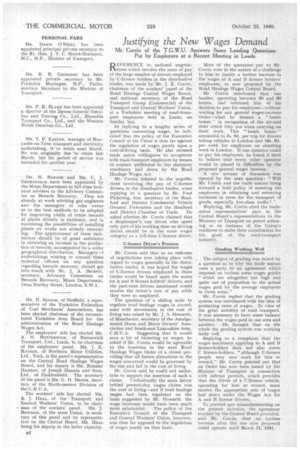Justifying the New Wages Demand Mr. Corrin of the T.G.W.U.
Page 20

If you've noticed an error in this article please click here to report it so we can fix it.
Answers Some Leading Questions Put by Employers at a Recent Meeting in Leeds REFERENCE to national negotiations which involve the rates of pay of the large number of driveit employed by C-licence holders in the distributive trades, was made by Mr. J. E. Corrin, chairman of the workers' panel of the Road Haulage Central Wages Board, and national secretary of the Road Transport Group (Commercial) of the Transport and General Workers' Union, at a Yorkshire meeting of road-transport employers held in Leeds, on Sunday last.
In replying to a lengthy series of questions concerning ‘vages, he indicated that the policy of the Executive Council of his Union is thus far against the regulation of wages purely upon a cost-of-living basis. He also stressed trade union willingness to co-operate with road-transport employers by means of contact additional to the statutory machinery laid down by the Road ,Haulage Wages Act.
Mr.Corrin referred to the negotia
• -tions involving the pay of C-licence drivers in the distributive trades, when • replying to a question by Mr. Fred Pickering, hon. secretary of the Bradford and District Commercial Vehicle . Owners' Federation and the Bradford and District Chamber of Trade. He . asked whether Mr. Corrin claimed that a shopkeeper's van driver who spent .only part of his working time on driving ,duties should be in the same wages category as a full-time C-licence driver.
Glicence 1Driyer's Position Mr. Corrin said that as an outcome. of negotiations now, taking place with regard to wages generally in the distributive trades, it was hoped the wages of C-licence drivers employed in those trades would be based upon the scales for A and B licence holders' drivers, and the part-time drivers mentioned would receive the driver's rate of pay while they were so employed.
The question of a sliding scale to regulate road haulage wages in accordance with movements in the cost of living was raised by Mr. J. S. Howarth, of Manchester, secretary of the Amiga mated Horse and Motor Owners' Association and South-east Lancashire Area,.
C.M.U.A. Suggesting that it would save a lot of bickering on wages, he asked if Mr. Corrin would be agreeable to the insertion in the next Road Haulage Wages Order of a clause providing that all future alterations in the wages concerned would be governed by the rise and fall in the cost of living.
Mr. Corrin said he could not undertake to support the insertion of such a clause. Undoubtedly the main factor behind present-day wages claims was the cost of living—and if road haulage wages had been regulated on the basis suggested by Mr. Howarth the wage increases would have been much more substantial. The policy of the Executive Council of the Transport and General Workers' Union, however, was thus far opposed to the regulation of wages purely on that basis. Most of the questions put to Mr. Corrin were in the nature of a challenge to him to justify a further increase in the wages of A and B licence holders' employees, as now proposed by ,the Road Haulage Wages Central Board.
Mr. Corrin mentioned that one haulier, operating between 50 and 60 lorries, had informed him of his decision to pay his employees—without -waiting for any general wages-increase Order—what he termed a "bomb bonus " in recognition of the air-raid risks which they ran when carrying on their work. This "bomb bonus " amounted. to 35. 6d, per trip for drivers' taking vehicles to London and 10s. 6d. perweek for employees on shunting work in London. Hone Operator could so pay his employees, he found it hard to believe -that every other operator would be placed in difficulties by the proposed general wages increase.
A new ' avenue of discussion was opened by the next question : Will Mr. Corrin and the trade unions bring forward a bold policy of assisting the employers in obtaining and enforcing increases in rates for the transport of goods, especially low-class traffic? "
Replying, Mr. Corrin cited the tradeunion representatives' part, in the Central, Board's representations to the Ministry of Transport on petrol rationing as au instance of the . Union's readiness to make their contribution for the good of., the road-transport industry.
Grading Working Weft
The subject of grading was raised by a question as to why the trade unions were a party,to an agreement which,
imposed on various areas wages grades " which are altogether too high and quite out of proportion to the actual wages paid by the average employers in those areas."
Mr. Corrin replied that the grading system was introduced-with the idea of protecting rates of wages. In view of the great mobility of road transport, it was necessary to have some balance between the wages paid in one area and another. --He thought that on the whole the grading systemwas working fairly well. .
Replying to a complaint that the wages machinery applying to A and B licence-holders does not also cover C licence-holders, "although C-licence people may now work for hire or reward," Mr. Corrin pointed out that an Order has now been issued by the .
Minister of Transport in connection with defence permits, which provides that the driver of a C-licence vehicle, operating for hire or 'reward, must receive the appropriate rate of 'wages laid down under the Wages Act for A and B licence drivers.
To prevent any misunderstanding on the present occasion, the agreement reached by the Central Board provided, said .Mr. Corrin, that no f uyther-increase after the one now proposed could operate until March 31, 1041.




















































